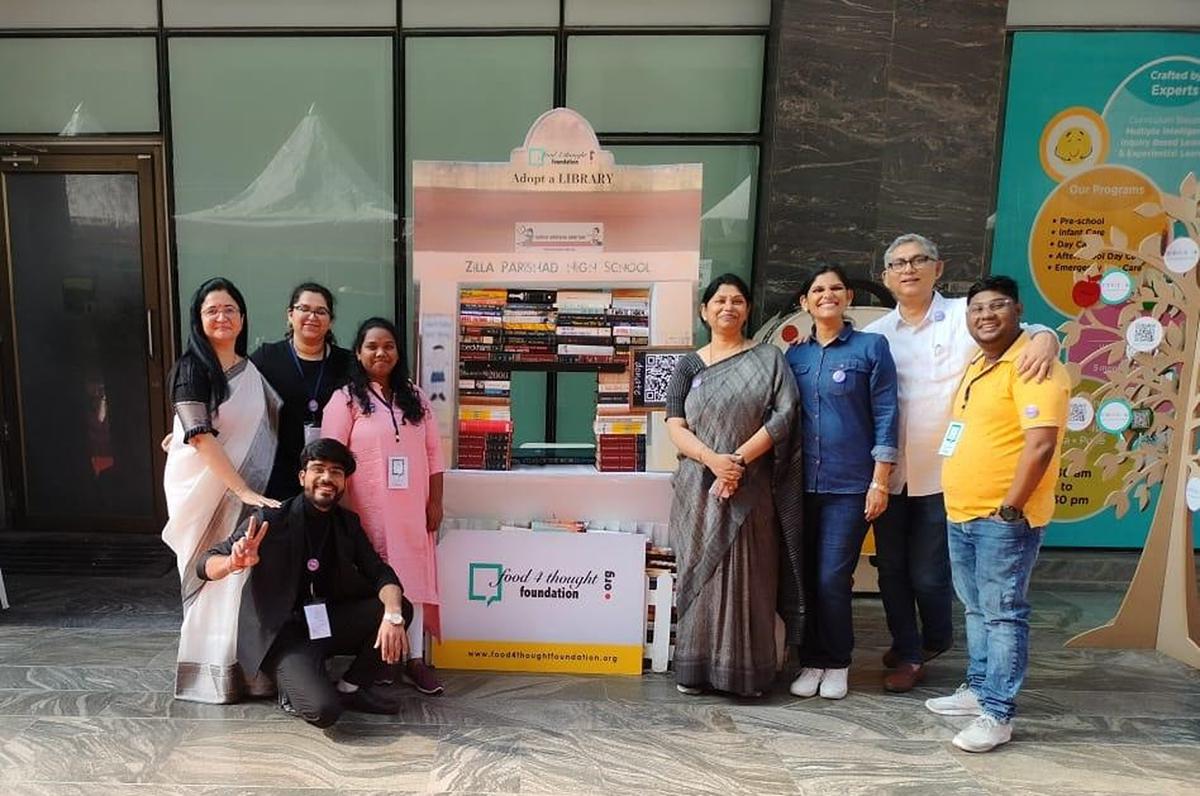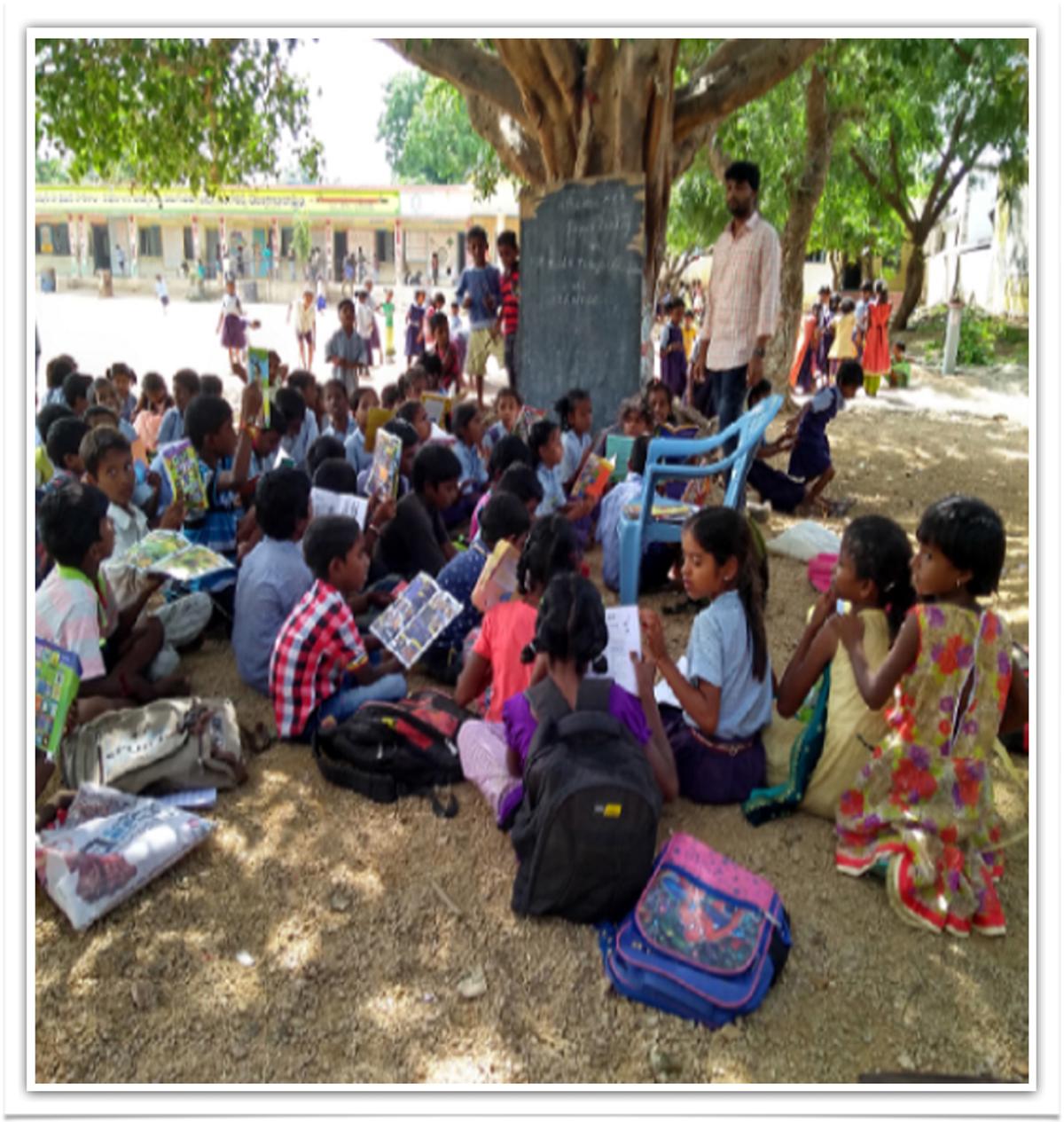
A library was set up at a school in Nongshken, Meghalaya, with the help of Food4Thought Foundation
| Photo Credit: Special Arrangement
“We help connect idle books to hungry minds,” reads a statement on the website of Hyderabad-based Food4Thought Foundation (food4thoughtfoundation.org). Formed in 2015 as a bridge connecting individuals who want to donate books idling on their shelves and educational institutions and those seeking books to open a small library, the organisation has helped set up 622 libraries across India. Their goal is to establish 1001 libraries by 2025. “Initially, we were contacting people and telling them about the need for libraries. Today, we get nearly 20 inquiries daily,” says Madhavi, one of the co-founders and director.
The libraries they have helped set up are at government schools, hospitals, parks, gated communities, and even prisons. While cities such as Bengaluru and Hyderabad have been proactive, there has been increased interest from Northeastern States and Gujarat, says Madhavi. So far, the Foundation has helped set up 250 libraries in Bengaluru, 135 in Telangana and Andhra Pradesh and 55 in the Northeast.

The Foundation’s multi-pronged activities include setting up and monitoring libraries, guiding teachers and volunteers for the upkeep of the library, cataloguing and barcoding the books to help donors track their books, encouraging reading habits through events such as reading Olympiads, storytelling sessions and quiz programmes, and building a digital catalogue of folk stories through podcasts.
Where does your book go?

Members of Food4Thought Foundation at the Hyderabad Literary Festival 2024 in January
| Photo Credit:
Special Arrangement
When approached by individuals who want to donate their books, the Foundation asks for the titles. “If they are children’s storybooks, we accept them immediately since several government schools need them. If the books are more fiction or non-fiction for adults, we identify appropriate libraries. We also talk to individuals keen on opening small libraries and then accept the books,” Madhavi explains. The Foundation does not accept textbooks or religious books.
Several requests come from schools in far-flung areas and the Foundation maps the students’ reading profile — level of ease with reading and languages — and then collates and ships 250 books. Madhavi explains, “We segregate books into levels one, two, three and four based on the reading difficulty. If the request is primarily for level one, we include 25 books from levels two and three so that at least some students will be motivated to go to the next level once they grasp the level one book.”
Small libraries have also been set up in outpatient departments of a few hospitals in Hyderabad, at the request of doctors. Libraries have also been set up at panchayat levels in villages, cafes in urban areas and a few prisons (Guwahati, Dibrugarh, Majuli and Nagaon). “If we know that someone will maintain the library, we help them set it up,” says Madhavi.
Are the books being used?

Students of MPPS, Chitkul, Telangana, browse through some of the books
| Photo Credit:
Special Arrangement
Setting up a library is only the initial step. For schools, a teacher is trained to maintain the library, encouraged to conduct two library classes per month and incentivised for the effort. On a dedicated app, the teacher logs in details of the library classes with audio and video recordings.
Establishing a library, monitoring it, courier charges for the books and periodic competitions to motivate children with gifts for the winners costs money and that, says the Food4Thought Foundation, prompted them to look for corporates and individuals to adopt libraries.
At this year’s Hyderabad Literary Festival in January, the Foundation put up a stall with a focus on adopting libraries.
While corporates are still warming up to this activity in Hyderabad, there’s been a good response in Bengaluru, says Madhavi. “An initial investment of ₹25000 and an annual sum of ₹11000 is charged to keep these school libraries running.”
Incentive to read
Besides establishing and maintaining libraries, the Foundation has also been helping conduct reading activities. The Reading Olympiad, for example, is a contest that tests the reading skills of students from schools in different regions. A new initiative called Reading Decathlon works as a quiz. “We invited six institutions, including international schools and schools with CBSE syllabus from different States, to Hyderabad. The students were given a list of books to read in advance, based on which a quiz and online were conducted,” adds Madhavi.

Participate online
Another initiative by the Foundation attempts to bring book clubs in the country under an umbrella to help members participate in activities conducted by clubs in other cities through online participation. Madhavi explains that book clubs in cities such as Sikkim and Dehradun have several members but very few authors travel to these locations for interactive sessions. Authors frequent book clubs in a few urban areas, but the clubs have not noticed an increase in membership. Connecting the clubs virtually and sharing their calendars, she says, helps members participate in more activities. So far 25 book clubs are under this umbrella.
Recording indigenous stories
Besides libraries and reading initiatives, the Foundation has been recording lesser-known indigenous stories, both oral and written folklore, as podcasts. In the first phase 501 stories in eight languages were recorded and are now available on their YouTube channel (Food4Thought Foundation). Most of these audio stories are of two to three-minute duration. Plans are on to record another 500 in 11 languages by December 2024. The Foundation hopes that all these initiatives help spark a reading revolution.



